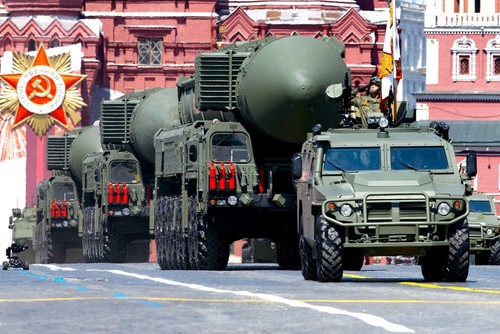 Russia's intercontinental ballistic missiles are seen at the Victory Day Parade on Red Square, Moscow, May 9, 2020. (Photo: AP) Russia's intercontinental ballistic missiles are seen at the Victory Day Parade on Red Square, Moscow, May 9, 2020. (Photo: AP)
|
New START, a nuclear arms reduction treaty signed in 2010, permits the US and Russia to maintain no more than 700 intercontinental ballistic missiles and strategic bombers. The treaty also limits each nation to 1,550 nuclear warheads.
Avoiding an arms race
The renewal of the New START treaty could prevent an arms race between the world's two leading nuclear powers. UN Secretary-General Antonio Guterres welcomed the news, calling the treaty a means of maintaining verifiable limits on the world's largest nuclear arsenal. He said he hopes that in the next five years, Russia and the US will negotiate a further reduction in the number of nuclear weapons they possess.
NATO said in a statement on Wednesday that the New START treaty “contributes to international stability, and NATO Allies again express their strong support for its continued implementation and for early and active dialogue on ways to improve strategic stability.”
The statement said that Allies remain collectively determined to uphold existing disarmament, arms control, and non-proliferation agreements and commitments. Allies support further arms control negotiations, with the aim of improving the security of the Alliance, taking into account the prevailing international security environment, the statement said, adding that Allies see the treaty’s extension as the beginning, not the end, of an effort to address nuclear threats and new and emerging challenges to strategic stability.
Under the Trump administration, Washington was not interested in renewing the treaty, which it believed was unfair. An effort to secure a shorter-term arms control deal with Russia, which would freeze all nuclear warheads and bring China into the deal, ended in a stalemate. Joe Biden indicated during his campaign that he favored keeping the treaty, which was negotiated while he was Vice President.
Future of Russia-US relations
In the short term, the extension of the treaty will allow both sides to continue to discuss arms control, both strategic and tactical, nuclear and non-nuclear, and negotiate strategic stability and arms reduction with a third party, which could be China, France, or the UK.
Experts say the treaty extension doesn’t solve any of the outstanding problems in Russia-US relations. Recent statements from the Kremlin and the White House show a stark contrast. While Russia says it hopes to work with the US on COVID-19, the economy, and trade, the US is more cautious, saying it will act aggressively to protect its national interests and respond to Russian acts that harm the US or its allies. During a phone call with NATO Secretary-General Jens Stoltenberg on January 26, President Biden “conveyed his intention to consult and work with allies on the full range of shared security concerns, including Afghanistan, Iraq, and Russia.”